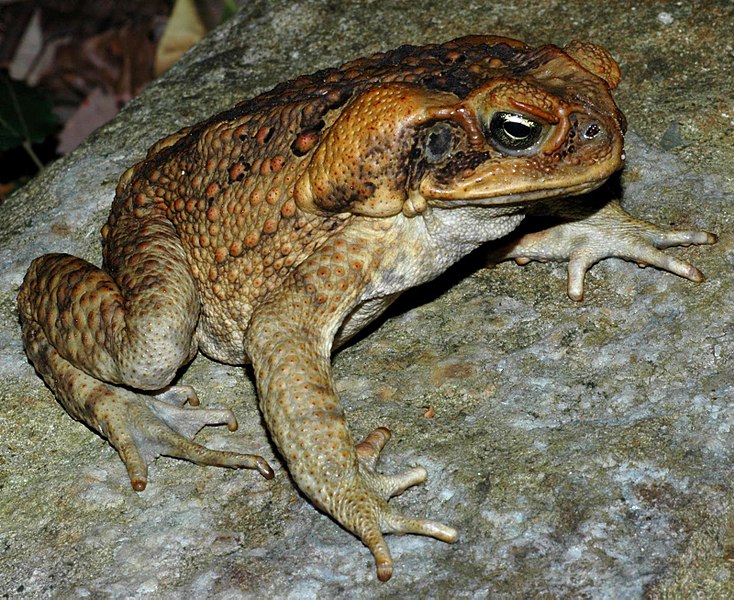One species imperilled by the cane toad is the Northern Quoll. The northern quoll has been almost driven to extinction in many parts of northern Australia because they attack the toad and are subsequently poisoned. The poison kills the quolls too quickly for them to learn not to do it again.
 In a recent study Conditioned taste aversion enhances the survival of an endangered predator imperilled by a toxic invader in the Journal of Applied Ecology, Stephanie O'Donnell, Jonathan Webb and Richard Shine from the University of Sydney tested whether quolls could be taught to avoid eating cane toads through "conditioned taste aversion" (CTA).
In a recent study Conditioned taste aversion enhances the survival of an endangered predator imperilled by a toxic invader in the Journal of Applied Ecology, Stephanie O'Donnell, Jonathan Webb and Richard Shine from the University of Sydney tested whether quolls could be taught to avoid eating cane toads through "conditioned taste aversion" (CTA).I spoke to Dr Webb about their study and how quolls can possibly be saved from extinction by CTA. To listen to this show, tune in here (or press play below):
Working with the Territory Wildlife Park, the researchers took a group of quolls and taught half (the "toad-smart" group) to associate eating a cane toad with feeling sick by feeding them a small dead cane toad laced with thiabendazole. The cane toad was too small to kill the quolls with its poison, however the tiabendazole made them feel sick. The second half of the quoll group ("toad-naive") were not fed the cane toad.
 The next part of the experiment was to feed the quolls a small, live cane toad in plastic container to see whether or not they attacked it. It was found that the toad-smart group was less likely to attack the toad in the plastic container. See the video below to catch this behaviour in action. It was also found that the toad-smart group survived up to five times longer in the wild than "toad-naive" quolls. The researchers also found that male quolls were far more likely than female quolls to attack cane toads. Dr Webb thinks that aerially deployed 'toad baits' ahead of the cane toad invasion front could educate quolls to avoid attacking cane toads before the toads invade.
The next part of the experiment was to feed the quolls a small, live cane toad in plastic container to see whether or not they attacked it. It was found that the toad-smart group was less likely to attack the toad in the plastic container. See the video below to catch this behaviour in action. It was also found that the toad-smart group survived up to five times longer in the wild than "toad-naive" quolls. The researchers also found that male quolls were far more likely than female quolls to attack cane toads. Dr Webb thinks that aerially deployed 'toad baits' ahead of the cane toad invasion front could educate quolls to avoid attacking cane toads before the toads invade.Cane toads were introduced to Australia from Hawaii in June 1935 to control the native Cane Beetle. They bred immediately in captivity, and by August 1935 more than 102 young toads were released in northern Queensland. Toads now number over 200 million and have steadily expanded through Queensland, reaching the border with New South Wales in 1978 and the Northern Territory in 1984. It is estimated that cane toads migrate at an average of 40 kilometres per year.
More on science daily. To listen to this show, tune in here (or press play below):
The video below (from YouTube) shows the toad-smart quoll leaving the cane toad alone - then knocking over the camera.












It is perfect time to make some plans for the future and it is time to be happy. I’ve read this post and if I could I desire to suggest you few interesting things or tips. Perhaps you could write next articles referring to this article. I want to read more things about it!
ReplyDeleteExcellent article. Very interesting to read. I really love to read such a nice article. Thanks! keep rocking.
ReplyDeleteThanks for some other informative website. Where else could I get that kind of info written in such a perfect way? I’ve a challenge that I am simply now running on, and I have been on the glance out for such information. บาคาร่าออนไลน์
ReplyDeleteThanks for a marvelous posting! I truly enjoyed reading it, yyou
ReplyDeletemight be a great author. I will make sure to bookmark your blog and will come back very soon. 바카라
I get pleasure from, cause I found just what I used to be having a look for. You’ve ended my four day long hunt! God Bless you man. Have a nice day. 사설토토
ReplyDeleteI accidentally searched and visited your site. I still saw several posts during my visit, but the text was neat and readable. I will quote this post and post it on my blog. Would you like to visit my blog later? keonha cai
ReplyDeleteWhen I read your article on this topic, the first thought seems profound and difficult. There is also a bulletin board for discussion of articles and photos similar to this topic on my site, but I would like to visit once when I have time to discuss this topic. sòng bạc
ReplyDelete